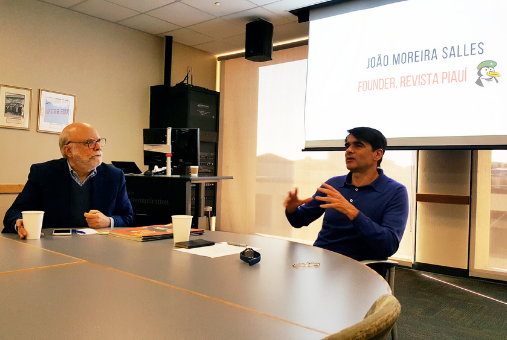Brazilian women sports reporters launched the online #DeixaElaTrabalhar (#LetHerWork) campaign after journalist Bruna Dealtry was kissed and harassed on live television.
Journalists and radio broadcasters at Empresa Brasileira de Comunicação (Brazil Communication Company, or EBC), a federal public agency, protested on March 20 against direction given by company managers to reduce coverage of the murders of Marielle Franco, a city councilor for Rio de Janeiro, and her driver Anderson Gomes, both killed in a March 14 shooting.
"What better way to do it than from an exercise of rewriting headlines that, even though they are sometimes thought to be well written from the point of view of generating information, if you look at them with a much more conscious focus of reality, you can discover that they contain sexist elements," Andrés Mompotes, deputy director of El Tiempo, told the Knight Center.
Ecuadoran Secretary of Communication Andrés Michelena confirmed that new President Lenin Moreno’s government is not contributing economically to multi-state owned cable news channel Telesur, newspaper La Hora reported.

João Moreira Salles spoke about the principle challenges facing the Brazilian press today, chief among them a lack of diversity in terms of race, economics, gender, religion, geography and media ownership.
Everyone wants to be masters of memory and omission, wrote French historian Jacques Le Goff in the early 1980s, about the disputes between different social groups for the collective memory of a society. In studying the relationship between communication and history, Brazilian communicator Marialva Barbosa took up the idea of Le Goff to affirm that journalists are also "masters of memory," since on a daily basis they select and determine what should be remembered and what can be forgotten.
The Knight Center for Journalism in the Americas is participating in the new Women Journo Heroes campaign led by the International Women’s Media Foundation (IWMF). For the month of October, IWMF is asking the community to help in honoring women journalists around the world by sharing photos of stories of courageous women journalists via Twitter, Facebook, Instagram and other platforms.
A series of initiatives that have emerged in Brazil in recent years have sought to increase the presence of women and experts of color as journalistic sources. The intention is to bring more diversity into the public debate and to transform the representation of these social groups in media, which mostly choose white men to be specialists and voices of authority in their stories.
Women journalists, communicators, programmers and designers in Latin American media are like diamonds forming under great pressure, according to CEO and founder of Chicas Poderosas, Mariana Santos. Her organization wants to bring these gems to the surface with a new incubator for women media entrepreneurs.
Women are leaders at more than 60 percent of digital media sites in Latin America.
In the early morning hours of March 28, journalist Julio Omar Gómez's house was set on fire in Baja California Sur and the bodyguard charged with protecting his life was shot and killed. About 24 hours later and across the country, Armando Arrieta Granados was shot while arriving home in Veracruz. Both journalists escaped, but one is in the hospital in serious condition.
Quechua, like Greek and Hebrew, is one of the world's ancestral languages that continues being used today. The language is still spoken in much of Peru, Bolivia, Ecuador and in some parts of Colombia, Chile and Argentina; however, the speed with which its use is being left behind is dizzying.